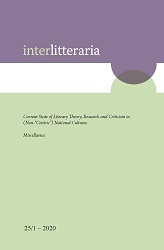For a Reappreciation of the Literary in Literary Studies: Poetic Thinking
For a Reappreciation of the Literary in Literary Studies: Poetic Thinking
Author(s): Marko PajevićSubject(s): Comparative Study of Literature, Philology, Theory of Literature
Published by: Tartu Ülikooli Kirjastus
Keywords: modern languages; German studies; world literature; comparative literature; Sprachdenken; life sciences; disciplines of meaning; poetics; poetic thinking; meaning-making processes;
Summary/Abstract: As a literary scholar based in German Studies outside of Germany, I am confronted with German being considered a minor subject matter. There are evidently clear differences between the German departments within German-speaking countries and abroad. The latter are shrinking considerably almost everywhere and need to focus on few aspects, often related to historical issues and some general successful movements, such as gender or postcolonialism. In Germany, there seems to be a preoccupation with didactics and media. But since I consider these symptoms part of a wider issue, I prefer making some more general observations. World literature is – at least in the dominant anglophone cultures – increasingly identified with English language literature. Comparative literature programmes mostly work with translations as if those were original literary texts which – roughly speaking – reduces literature to its plot and, possibly, its structure. This is also reflected in the tendency in literary studies to be oblivious of the poetic approach. Philologies are often subservient to outer goals (history, sociology, psychology), and, in their efforts to justify their existence in the eyes of the market economy, they believe they cannot afford to deal with the core of what literature is about, the literary. In my view, this is one of the reasons for the difficulties of the philologies and possibly Humanities altogether. Literary studies, despite the various enriching overlaps with various other disciplines, should not forget this specificity, which I call poetics, the interaction of the form of language and the form of life. By making a strong case for the relevance of an understanding of what language is and does – and literature is the privileged field of observation – philologies would be of obvious importance for society as a whole.
Journal: Interlitteraria
- Issue Year: XXV/2020
- Issue No: 1
- Page Range: 8-15
- Page Count: 8
- Language: English

